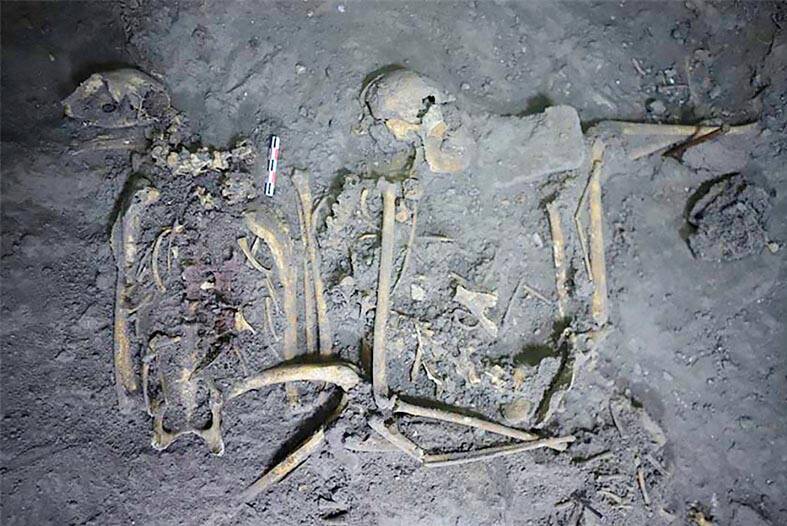Seventeen hundred years ago, a female spider monkey was presented as a treasured gift — and later sacrificed — to strengthen ties between two major powers of pre-Hispanic America, a new study said on Monday.
The paper, published in the Proceedings of the National Academy of Sciences, compared the offering by Maya elites to Teotihuacan to China’s panda diplomacy that accompanied the normalization of Sino-US relations in the 1970s.
By using multiple techniques — including extraction of ancient DNA, radiocarbon dating and chemical dietary analysis — researchers reconstructed the life and death of the primate, finding that she was likely between five and eight years old when buried alive.

Photo: Nawa Sugiyama / UC Riverside / AFP
“It’s such an exciting time to be doing archeology, because the methodology is finally here,” lead author Nawa Sugiyama of the University of California, Riverside told reporters.
The work began with Sugiyama’s surprising discovery in 2018 of the animal’s remains in the ruins of Teotihuacan, a UNESCO World Heritage Site in the arid Mexican Highlands.
Spider monkeys are not native to the elevated region, leaving Sugiyama with a puzzle to solve: What was the animal doing there, who brought it, and why was it sacrificed?
Vital clues came from the remains’ location. Teotihuacan, which lies 48km northeast of Mexico City, was an important site of cultural exchange and innovation in Classic Mesoamerica.
It is perhaps best known for the pyramids of the Moon, Sun and Feathered Serpent, but there is increasing interest in another monument called the Plaza of the Columns, a complex where neighboring Maya maintained a presence likened to a modern-day embassy.
The monkey’s skeletal remains were found in the complex alongside a golden eagle — an emblem of Mexico even today — and surrounded by a collection of high-value items, including obsidian projectile points, conch shells and precious stone artifacts.
More than 14,000 ceramic shards from a grand feast were also discovered, as well as a Maya mural depicting the spider monkey.
This was further evidence of an exchange that took place at the highest levels, and preceded the Teotihuacan state’s later rise and military involvement in Maya cities by the year 378, Sugiyama said.
Results from chemical analysis involving two canine teeth that erupted at different points in the monkey’s life indicate that prior to captivity she lived in a humid environment, and ate plants and roots.
After being captured and brought to Teotihuacan, her diet was closer to that of humans, including corn and chili peppers.
The spider monkey might have been “an exotic curiosity alien to the high elevations of Teotihuacan,” Sugiyama and colleagues wrote.
Ultimately, the animal met a grisly demise.
“Hands bound behind its back and tethered feet indicate en vivo burial, common among human and animal sacrifices at Teotihuacan,” the authors wrote.
“We need to understand and contextualize these cultural practices ... and what it meant to be able to give up that which is most precious to you,” Sugiyama added.

POLITICAL PRISONERS VS DEPORTEES: Venezuela’s prosecutor’s office slammed the call by El Salvador’s leader, accusing him of crimes against humanity Salvadoran President Nayib Bukele on Sunday proposed carrying out a prisoner swap with Venezuela, suggesting he would exchange Venezuelan deportees from the US his government has kept imprisoned for what he called “political prisoners” in Venezuela. In a post on X, directed at Venezuelan President Nicolas Maduro, Bukele listed off a number of family members of high-level opposition figures in Venezuela, journalists and activists detained during the South American government’s electoral crackdown last year. “The only reason they are imprisoned is for having opposed you and your electoral fraud,” he wrote to Maduro. “However, I want to propose a humanitarian agreement that

ECONOMIC WORRIES: The ruling PAP faces voters amid concerns that the city-state faces the possibility of a recession and job losses amid Washington’s tariffs Singapore yesterday finalized contestants for its general election on Saturday next week, with the ruling People’s Action Party (PAP) fielding 32 new candidates in the biggest refresh of the party that has ruled the city-state since independence in 1965. The move follows a pledge by Singaporean Prime Minister Lawrence Wong (黃循財), who took office last year and assumed the PAP leadership, to “bring in new blood, new ideas and new energy” to steer the country of 6 million people. His latest shake-up beats that of predecessors Lee Hsien Loong (李顯龍) and Goh Chok Tong (吳作棟), who replaced 24 and 11 politicians respectively

Young women standing idly around a park in Tokyo’s west suggest that a giant statue of Godzilla is not the only attraction for a record number of foreign tourists. Their faces lit by the cold glow of their phones, the women lining Okubo Park are evidence that sex tourism has developed as a dark flipside to the bustling Kabukicho nightlife district. Increasing numbers of foreign men are flocking to the area after seeing videos on social media. One of the women said that the area near Kabukicho, where Godzilla rumbles and belches smoke atop a cinema, has become a “real

‘WATER WARFARE’: A Pakistani official called India’s suspension of a 65-year-old treaty on the sharing of waters from the Indus River ‘a cowardly, illegal move’ Pakistan yesterday canceled visas for Indian nationals, closed its airspace for all Indian-owned or operated airlines, and suspended all trade with India, including to and from any third country. The retaliatory measures follow India’s decision to suspend visas for Pakistani nationals in the aftermath of a deadly attack by shooters in Kashmir that killed 26 people, mostly tourists. The rare attack on civilians shocked and outraged India and prompted calls for action against their country’s archenemy, Pakistan. New Delhi did not publicly produce evidence connecting the attack to its neighbor, but said it had “cross-border” links to Pakistan. Pakistan denied any connection to